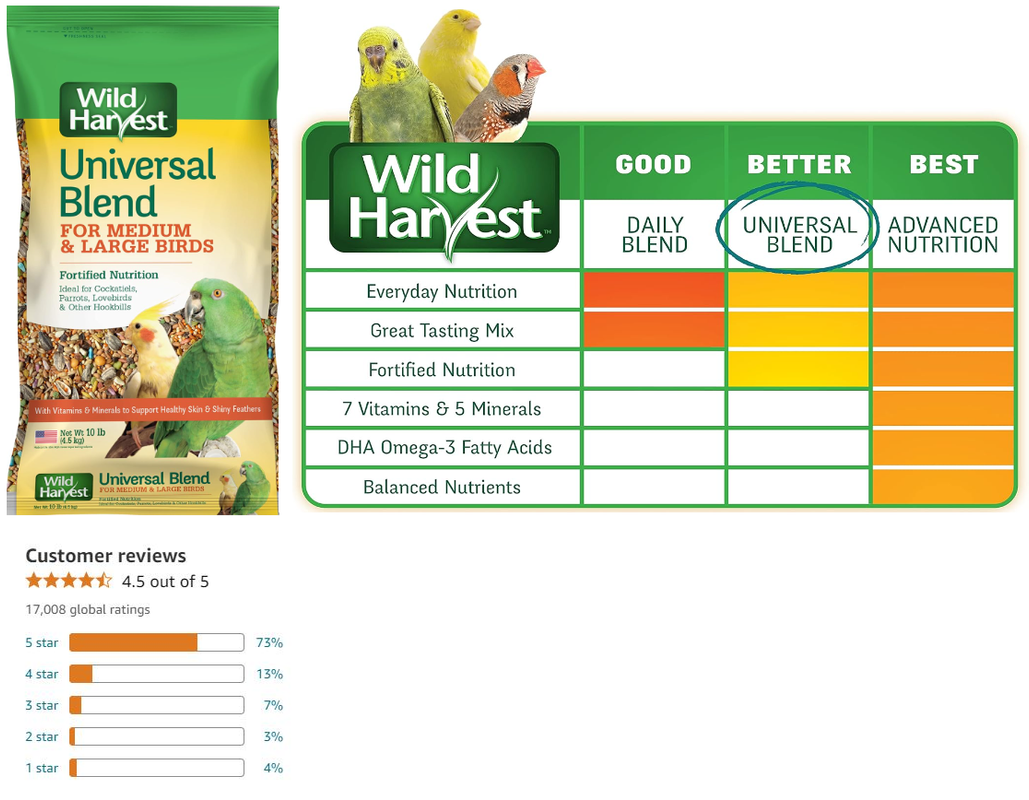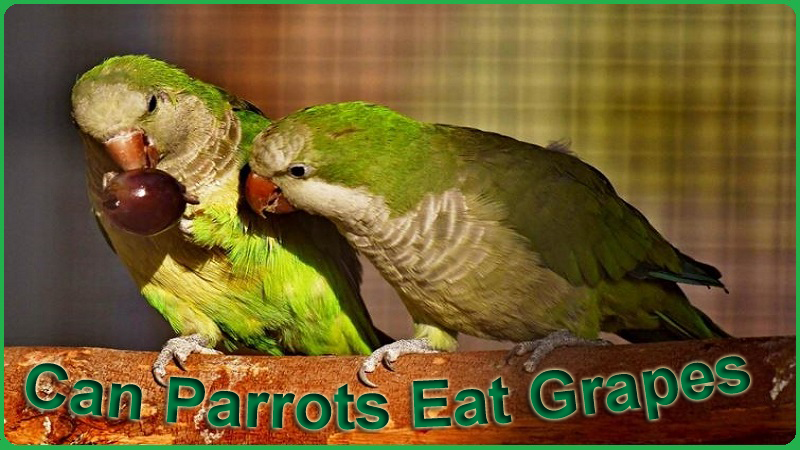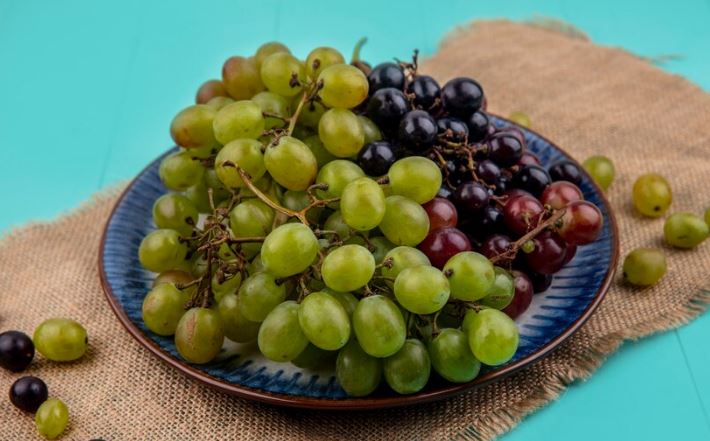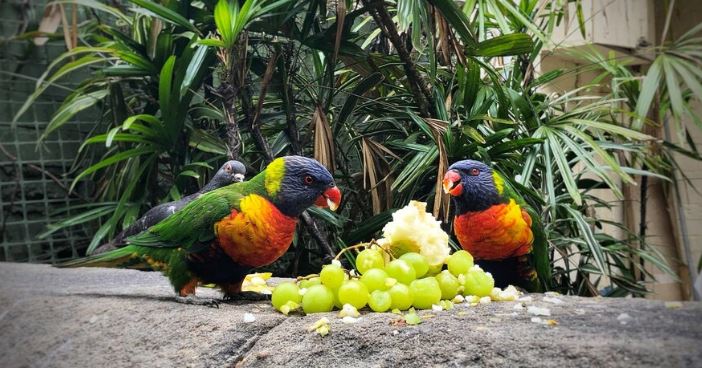Through this article, you will look all good and bad things of grapes for parrots; and solve your query regarding ‘Can Parrots Eat Grapes with Seed and Peeps or Not’ with ease without any hassle.
Are grapes safe side for your loving parrot to feed? If you are parrot owner, then good news for you ‘Yes’. Grapes are best option for healthy treat for parrots, but allowed in moderation; because it contains the sugar content in higher amount.
As you known that parrots come in delicate creature’s birds with unique nutritional needs. So, you should understand perfectly about which kinds of foods are safe for them to eat, and which are bad. If you feed grapes to parrots in low amount, but in moderation; then it will work as a best treat.
Do Parrots Like to Eat Grapes?
Yes! Parrots prefer to eat grapes along with their seeds and peels, but in moderation. Generally, Grapes consider as safe food for your parrots. But, they contain high fructose, so overfeeding can get harm their health.

Therefore, you should wash grapes thoroughly to reduce pesticide contamination, especially the peels. Grapes can have a waxy coat where chemicals may stick. Grapes are safe for parrots, but you avoid excessive feeding to keep away nutritional deficiencies and health issues.
Benefits of Grapes for Your Parrots
Grapes have several benefits for parrots when they fed in moderation:
Also Read: Can Parrots Eat Strawberries? Should Be Known
Nutritional Value: Grapes are rich in vitamins and minerals like vitamin C, vitamin K, potassium, and antioxidants. With getting of these nutrients, parrot’s overall health and immune system function will be improved.
Hydration: Grapes have high water content that can help keep your parrot hydration problem. Especially in hot weather; if they’re not drinking enough water.
Natural Treat: Parrots enjoy the sweet taste of grapes, making them a favorite treat. With offering grapes as a treat; it can help with behavioral enrichment with your pet.
Digestive Health: Grape’s fiber content can support healthy digestion in parrots. So, fiber content is most helpful for regular bowel movements and preventing constipation.
Bone Development: Grapes also contain the potassium that helps to develop the bone and hormone. It also keep maintaining the regular heartbeat, and helps regulate electrolyte balance
Healthy Eyes: Proteins also found in grapes that help to enhance eye health by improving photo-receptor cells in the retina. It also can get lowering inflammatory proteins, and increasing protective proteins.
Drawbacks of Grapes for Parrots: Exceed Consumption
When parrots have grapes in high amount; they can lead to several health problems, including:
Obesity
Grapes contain natural sugars, and its excessive consumption can get to weight gain and obesity in parrots. Due to obesity, parrots can effect with many health issues, including heart problems, joint pain, and decreased lifespan.
Digestive Issues
Overeating grapes can get digestive problems in parrots, such as diarrhea or gastrointestinal discomfort. So, due to consume high sugar, beneficial bacteria in the digestive tract can get disturb, then getting to digestive disturbances.
Nutritional Imbalance
If your parrot consumes too many grapes; it may fill up on this one type of food and neglect other essential nutrients in its diet. As resulting this, it can get nutritional imbalance and deficiencies in necessary vitamins, minerals, and protein.
Toxicity Concerns
As you known that grapes are not toxic to parrots, but seeds and skin contain compounds that can be harmful if consumed in large quantities. Grape seeds contain low amounts of compounds like tannins and cyanide. So, they can be toxic to birds if ingested in large amounts.
Dental Health
Cause of getting natural sugars in grapes, many dental issues can effect in parrots, such as tooth decay and gum disease; especially if their teeth are not regularly cleaned.
Risk of Diabetes
The high sugar content in grapes can develop the risk of diabetes in parrots. If they consume grapes continuously, then it can negatively impact on parrot’s Infecting insulin sensitivity. Then, it potentially can lead to metabolic deficiencies, illnesses, and diseases.
Break Down Nutritional Information of Grapes
Here, we will provide to summarize the key nutritional components found in grapes for parrots. These are getting to highlight their health benefits, and importance for parrot’s diet.
Also Read: Can Parrots Eat Carrots? (Yes or Not} Feeding Guide
| Nutrient | Amount Per 100g | Benefits for Parrots |
|---|---|---|
| Calories | 69 kcal | Provides energy without excessive calorie intake |
| Water | 81g | Helps maintain hydration levels, especially in warmer climates |
| Carbohydrates | 18g | Provides energy, but offer in moderation to prevent excessive sugar intake |
| Fiber | 0.9g | Supports digestive health by aiding in proper digestion and preventing constipation |
| Protein | 0.7g | Provides essential amino acids for muscle development and overall health |
| Fat | 0.2g | Low-fat content is suitable for maintaining a healthy weight |
| Vitamins and Minerals | ||
| Vitamin C | 10% of DV | Supports the immune system and overall health |
| Vitamin K | 14% of DV | Important for blood clotting and bone health |
| Potassium | 191mg (5% of DV) | Maintains proper fluid balance and muscle function |
| Copper | 4% of DV | Supports various physiological processes in the body |
| Manganese | 5% of DV | Important for bone health and metabolism |
Are Seeds and Peels Good for Parrots or Not?
Generally, you can consider seeds and peels as safe and beneficial for parrot’s diet, as outlined in the provided by our parrot advisor:
Seeds: Grape seeds are safe and nutritious for feeding your parrot. It also is having some additional antioxidants and nutrients that are beneficial for parrot’s health. But you should cut grapes into smaller pieces, and give the seeds separately to smaller parrot species to avoid any choking hazards.
Peels: The peels of grapes, especially dark-colored grapes that having rich in antioxidants, polyphenols, and phytonutrients. For well-being health of parrot, these components are helpful to reduce inflammation and protect against free radicals. As per our advisor, don’t remove the peels, as most of the antioxidants present in the skin.
Are Grapes Safe for Baby Parrots?
Grapes are tasty and nutritious treat for adult parrots, but you give them in moderation. However, when you come to baby parrots, then recommended to avoid feeding them grapes until they are older. The main concern about feeding grapes to baby parrots is associated to their small size and developing digestive systems.
Grape’s seeds can pose a choking hazard to baby birds. Moreover, the high sugar content in grapes may not be suitable for very young parrots, because their digestive systems are still developing. So, they are not be able to handle it as effectively as adult birds
How Often Should I Feed My Parrot Grapes?
Based on our advisors, you should offer grapes to parrots no exceed to 2-3 times per week, so it prevents them from potentially developing nutritional deficiencies. If, parrots feed them in high amount, so due to this; they can neglect other essential foods. Keeping remember about grapes, they consist high in natural sugars.
Also Read: Can Parrots Eat Tomatoes? Complete Feeding Guide
So, you offer them sparingly to prevent excessive sugar consumption and maintain a balanced diet for your parrot. Small to medium-sized birds can generally eat 1-2 grapes per day, while larger birds may be capable to eat a few more.
Important!! Cut grapes into small, bite-sized pieces to prevent choking and always wash them thoroughly.
Proper Guidelines to Feed Grapes for Parrots
Feeding grapes to parrots can be a delightful treat, but it’s important to do so safely and in moderation. Here are some proper guidelines to follow:
Mostly Choose Seedless Grapes: You always choose seedless grapes to avoid the risk of choking and potential toxicity. There are some safe choices like seedless red or green grapes.
Wash Thoroughly: Before going to feed grapes to your parrot, wash them thoroughly under running water to remove any pesticides, dirt, or contaminants.
Cut into Bite-Sized Pieces: Cut the grapes into small, bite-sized pieces. These pieces are easier to eat by your parrot and reduce choking risks.
Remove Seeds and Peel: You also should extra care to remove all seeds and the peel from the grapes. Grape seeds have some compounds that can be toxic to parrots. Peel may be also difficult for them to digest.
Offer in Moderation: You should offer grapes in moderation as part of a balanced diet. If your parrot feed too many grapes; then it can pose many health issues such as obesity and diabete.
Monitor for Allergic Reactions: Introduce grapes gradually into your parrot’s diet, and monitor for any signs of allergic reactions. If you notice any adverse effects, quickly discontinue feeding grapes.
Freshness Matters: You should always offer fresh grapes to your parrot, and remove any uneaten portions promptly to prevent spoilage.
Best Alternative to Grapes for Your Parrot
Sure, here are some alternatives to grapes for parrot’s well-being health:
- Apple Slices
- Banana Chunks
- Berries (Blueberries, Strawberries, Raspberries, Blackberries)
- Melon Chunks (Watermelon, Cantaloupe, Honeydew)
- Pineapple Chunks
- Papaya Chunks
- Kiwi Slices
- Mango Chunks
- Grapefruit Segments
- Cherries (pitted)
FAQs (Frequently Asked Questions)
Are Grapes Safe for Parrots?
Sure, grapes are safe food for parrots; they are not inherently toxic to them. But, feeding grapes in moderation and consider the nutritional balance of the parrot’s diet.
What Should I Do If My Parrot Eats Grape Seeds Accidentally?
If, your parrot intakes grape seeds accidentally, then monitor them closely for any signs of distress or illness. If, you see any unusual behavior, quickly Contact your veterinarian
Can Parrots Have Grapes with Seeds?
Yes! Parrots do enjoy cracking and eating grape seeds, because they provide additional nutrients. Grape seeds are not able to inherent toxic to parrots, unlike the seeds of some other fruits like apples. If feeding grapes with seeds, then you keep monitoring the parrot, and ensure they easily consume the seeds without any problems.
Verdicts Up
Grapes enable with various beneficial nutrients for your loving parrot. They love grapes, so easy to add the grapes in parrot’s diet for well-being health. Grapes should be allowed in moderation, with washing thoroughly to reduce the pesticide contamination’s risk.
Also Read: Can Parrots Eat Watermelon (Seed + Rind)? Feeding Guide
If this content is valuable for you, then share it along with your friends, family members, parrot lovers or relatives over social media platforms like as Facebook, Instagram, Linked In, Twitter, and more.
Do you have any experience, tips, tricks, or query regarding on this? You can drop a comment!
Have a Nice Day!!






